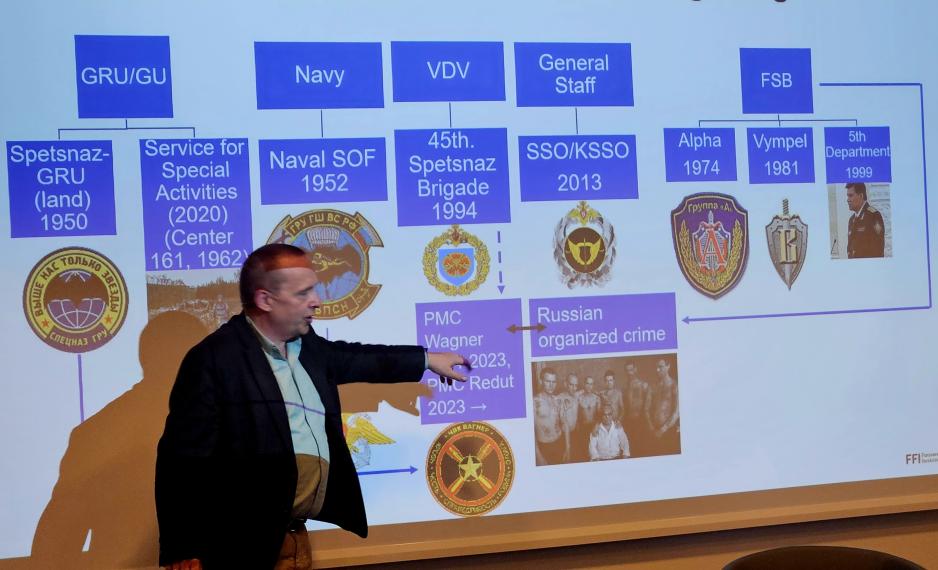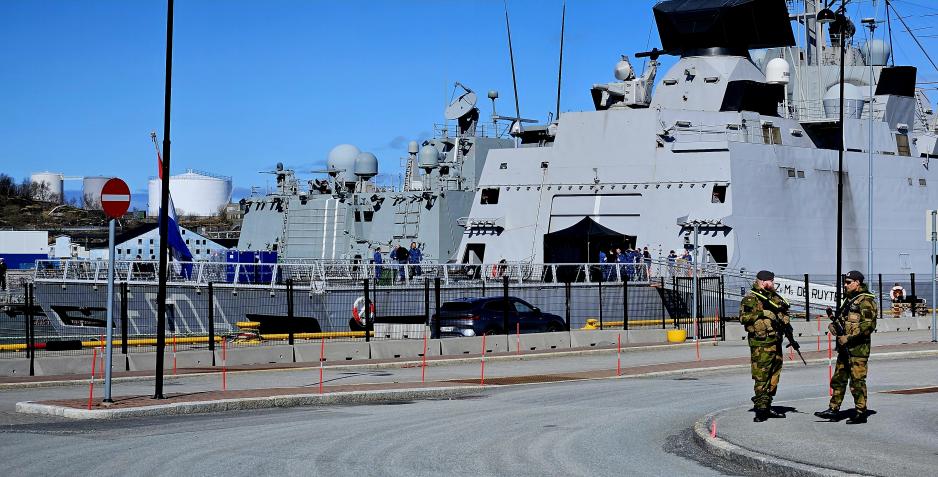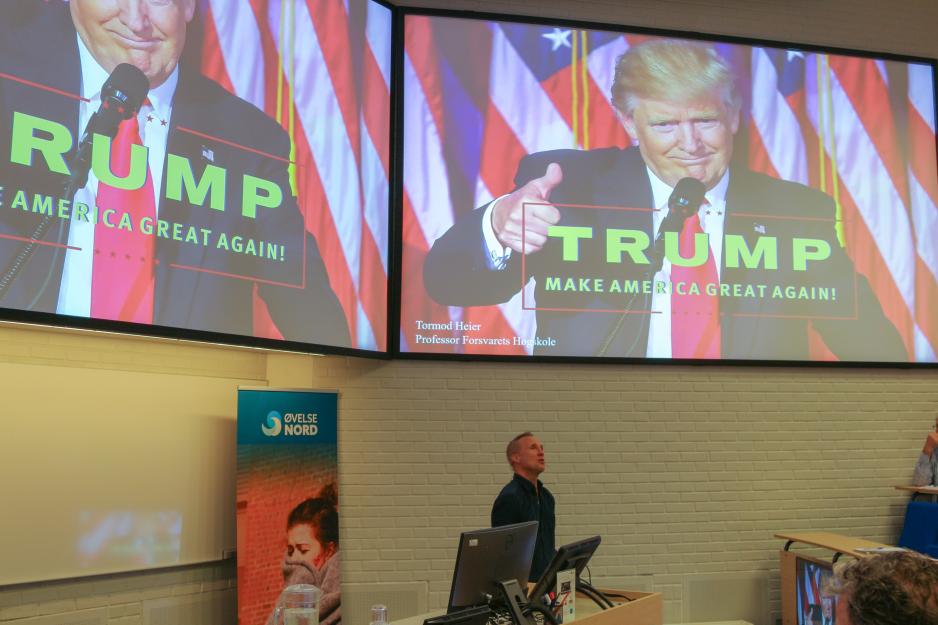Arne O. Holm says They Are Practically Stumbling in the Dark, but the Message Is Crystal Clear

Tor Bukkvold, Senior Research Fellow at the Norwegian Defence Research Establishment, is one of many experts who struggle to say something definite about the future. (Photo: Arne O. Holm)
Comment: The experts who are supposed to inform us about the future in a war-ridden Europe are practically stumbling in the dark. So what are they still trying to tell us?
The demand for analyses of the security policy situation is enormous. Everyone wants to know what is happening, not least in the Arctic and the High North.
We are noticing it also here in the newspaper, where we can walk dry-shod between lectures and debates, even on days when the winter once again tightens its grip around optimistic summer shoes.
Difference between the North and the South
Because the differences are currently significant, both climatically and otherwise, between the North and the South.
Claiming that the experts are stumbling in the dark is no accusation. On the contrary, it is an acknowledgement of how confidence is a necessary, but perhaps fatally lacking, quality when it comes to predictions for the future.
Fatally, because the interaction between Donald Trump and Vladimir Putin, together with a Chinese shadow boxer with increasingly international power, is a game filled with unknown cards.
Struggle to understand what the world looks like in two to three years.
And they know it themselves, whether they are from the Armed Forces, from colleges and universities, from research institutions, or national security authorities, such as the Intelligence Service or the Police.
Falling short
The world has become so unpredictable that the traditional disciplines fall short in the face of today's reality.
Then, add an American president lacking in self-control, anger management, and knowledge of international relations, and the unpredictability is total.
The other day, I spent the day at a security policy seminar under the auspices of Øvelse Nord (a full-scale preparedness exercise in Bodø, Northern Norway) at Nord University.
Some of our most prominent security policy experts took the stage, one after the other, while the Bodø Harbour was concurrently filling up with eight warships. They had been deployed by NATO in connection with the major military exercise "Formidable Shield," kicking off next week.

Military vessels are currently occupying the Bodø Harbour, as part of yet another major military exercise in the North. (Photo: Arne O. Holm)
The first one on stage is a uniform-clad Gjert Lage Dundal, Major General in the Air Force and Deputy Commander and Chief of Staff at the Norwegian Joint Headquarters (NJHQ) at Reitan outside Bodø. Few, if any, are seated closer to the center of events, halfway between the USA and Russia.
The headquarters is visited almost daily by military leaders from Europe.
"There is great uncertainty regarding what will happen in the future," said Dyndal, who, according to himself, is currently sitting high in the chair inside the mountain, a few miles east of Bodø.
"We must not get stuck too much in the scenarios we are currently seeing. We struggle to understand what the world looks like in two to three years," he summarized, and pointed to Ukraine, the Middle East, and the High North.
Nuclear confrontation
Kristin Veen Bruusgaard is the Director of the Norwegian Intelligence School, an educational institution that trains employees in the Intelligence Service and the Armed Forces. In a fastidiously prepared manuscript, because the Intelligence Service usually sticks to prepared manuscripts, she reinforced Dyndal's message.
"We must be prepared for nuclear confrontation, providing an entirely different dynamic," she said after stating that a conflict would have major consequences in our immediate areas, even though the conflict is not about these areas.
Tor Bukkvold, Senior Research Fellow at the Norwegian Defence Research Establishment, took us into the war already taking place, also on Norwegian soil.
The hybrid war.
More specifically, the violent part of hybrid warfare. Put simply, this is about Russia's will and ability to use violence below the threshold of military confrontation.
Bukkvold talked about Russia, where deterrence is demonstrated through action. And because the decisions on action are increasingly pushed further down the hierarchy, often to private armies or criminal organizations, it becomes increasingly unpredictable.
Also read
False news
Eskil Grehndal Sivertsen is a special adviser at the Norwegian Defence Research Establishment, with special expertise in what is called cognitive warfare and influence operations. Or as he defined it:
"A collective term for all kinds of fuckery that can be done."
This includes producing false news, which finally ends up as truths for the US VP J.D. Vance or Donald Trump, for example, and thus becomes part of the decision-making foundation for the American foreign and security policy.
Tormod Heier, Professor at the Norwegian Defence University College, and one of the most sought-after commentators on war and peace, could not find answers in his crystal ball, either. Not even to the question of whether the United States will stand up for Europe in the future.
"It does not help to have access to the most powerful military alliance when you don't have a boss who is willing to use it. If Trump manages a 'deal' with Putin, then Europe might not have that great a value?" asked Heier.
A collective term for all kinds of fuckery.
Very surprised
This issue, or at least a variation, was also covered by Håkon Lunde Saxi, also a professor at the Norwegian Defence Research Establishment and sought-after commentator based in the North.
"I would be very surprised if 100,000 US soldiers were placed in Europe in ten years," said Saxi, among other things.
Finally, another quote from a professor at the Norwegian Defence Research Establishment, this time Njord Wegge. He stated quite simply that "Very unpredictable things could happen."
"Almost every time I speak to the military, they say that plans are outdated and new ones must be made."
It is tempting to add that every time I listen to an expert, the future prospects become more terrifying.

Tormod Heier, Professor at the Norwegian Defence University College and former Lt. Colonel in the Army. He participated in several debates during Øvelse Nord 2025. (Photo: Trine Jonassen)
But that is not necessarily the motive of the analysts. They definitely want to prepare us for a new world order.
We pay
But they also want to pave the way for staggering funds for the Armed Forces over the next decade. These are appropriations that have to be obtained from somewhere, like healthcare.
Therefore, it is also about getting us to understand the gravity of the situation and to accept severe cuts in the civilian part of society.
So, of course, the experts know what they are talking about.
They just don't know what may happen in the future.




